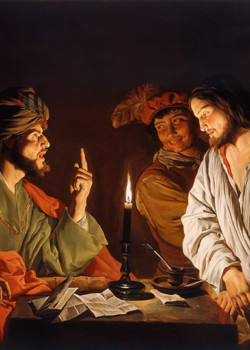
Perfect Composure
But Caiaphas could not longer endure the sight of the Master standing there in perfect composure and unbroken silence. He thought he knew at least one way in which the prisoner might be induced to speak. Accordingly, he rushed over to the side of Jesus and, shaking his accusing finger in the Master's face, said: “I adjure you, in the name of the living God, that you tell us whether you are the Deliverer, the Son of God.” Jesus answered Caiaphas: “I am. Soon I go to the Father, and presently shall the Son of Man be clothed with power and once more reign over the hosts of heaven.” ~ The Urantia Book, 184:3.14
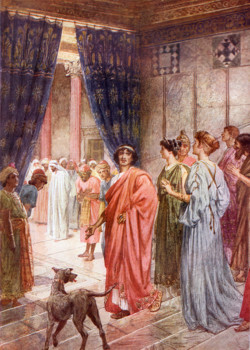
Herod Had Forgotten Jesus, the Lad
When Herod Antipas stopped in Jerusalem, he dwelt in the old Maccabean palace of Herod the Great, and it was to this home of the former king that Jesus was now taken by the temple guards, and he was followed by his accusers and an increasing multitude. Herod had long heard of Jesus, and he was very curious about him. When the Son of Man stood before him, on this Friday morning, the wicked Idumean never for one moment recalled the lad of former years who had appeared before him in Sepphoris pleading for a just decision regarding the money due his father, who had been accidentally killed while at work on one of the public buildings. ~ The Urantia Book, 185:4.1
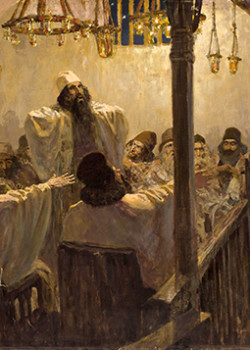
How They Flattered Themselves!
It was about half past three o'clock this Friday morning when the chief priest, Caiaphas, called the Sanhedrist court of inquiry to order and asked that Jesus be brought before them for his formal trial. On three previous occasions the Sanhedrin, by a large majority vote, had decreed the death of Jesus, had decided that he was worthy of death on informal charges of lawbreaking, blasphemy, and flouting the traditions of the fathers of Israel.
How these chief priests, scribes, Sadducees, and some of the Pharisees flattered themselves that Jesus, the disturber of their position and the challenger of their authority, was now securely in their hands! And they were resolved that he should never live to escape their vengeful clutches. ~ The Urantia Book, 184:3.1
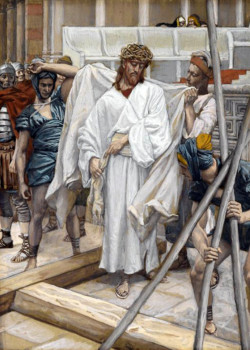
Alone with the Soldiers
After Pilate had washed his hands before the multitude, thus seeking to escape the guilt of delivering up an innocent man to be crucified just because he feared to resist the clamor of the rulers of the Jews, he ordered the Master turned over to the Roman soldiers and gave the word to their captain that he was to be crucified immediately. Upon taking charge of Jesus, the soldiers led him back into the courtyard of the praetorium, and after removing the robe which Herod had put on him, they dressed him in his own garments. These soldiers mocked and derided him, but they did not inflict further physical punishment. Jesus was now alone with these Roman soldiers. His friends were in hiding; his enemies had gone their way; even John Zebedee was no longer by his side. ~ The Urantia Book, 186:4.1
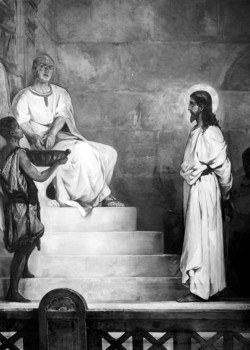
Pilate Washed His Hands
Pilate was afraid of a tumult or a riot. He dared not risk having such a disturbance during Passover time in Jerusalem. He had recently received a reprimand from Caesar, and he would not risk another. The mob cheered when he ordered the release of Barabbas. Then he ordered a basin and some water, and there before the multitude he washed his hands, saying: "I am innocent of the blood of this man. You are determined that he shall die, but I have found no guilt in him. See you to it. The soldiers will lead him forth." And then the mob cheered and replied, "His blood be on us and on our children." ~ The Urantia Book, 185:8.2

A Moral Coward
As Pilate, trembling with fearful emotion, sat down by the side of Jesus, he inquired: "Where do you come from? Really, who are you? What is this they say, that you are the Son of God?"
But Jesus could hardly answer such questions when asked by a man-fearing, weak, and vacillating judge who was so unjust as to subject him to flogging even when he had declared him innocent of all crime, and before he had been duly sentenced to die. Jesus looked Pilate straight in the face, but he did not answer him. Then said Pilate: "Do you refuse to speak to me? Do you not realize that I still have power to release you or to crucify you?" Then said Jesus: "You could have no power over me except it were permitted from above. You could exercise no authority over the Son of Man unless the Father in heaven allowed it. But you are not so guilty since you are ignorant of the gospel. He who betrayed me and he who delivered me to you, they have the greater sin."
This last talk with Jesus thoroughly frightened Pilate. This moral coward and judicial weakling now labored under the double weight of the superstitious fear of Jesus and mortal dread of the Jewish leaders. ~ The Urantia Book, 185:7.1

What shall I do with him?
Finally, Pilate addressed himself once more to the solution of the problem which confronted him, by asking the mixed assembly of Jewish rulers and the pardon-seeking crowd, "What shall I do with him who is called the king of the Jews?" And they all shouted with one accord, "Crucify him! Crucify him!" The unanimity of this demand from the mixed multitude startled and alarmed Pilate, the unjust and fear-ridden judge.
Then once more Pilate said: "Why would you crucify this man? What evil has he done? Who will come forward to testify against him?" But when they heard Pilate speak in defense of Jesus, they only cried out all the more, "Crucify him! Crucify him!"
Then again Pilate appealed to them regarding the release of the Passover prisoner, saying: "Once more I ask you, which of these prisoners shall I release to you at this, your Passover time?" And again the crowd shouted, "Give us Barabbas!" ~ The Urantia Book, 185:5.9
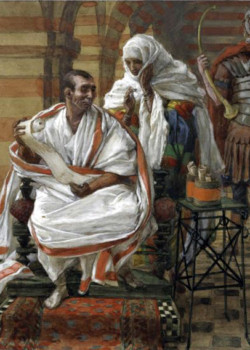
The Message From Claudia
Pilate knew Jesus was innocent of the charges brought against him, and had he been a just and courageous judge, he would have acquitted him and turned him loose. But he was afraid to defy these angry Jews, and while he hesitated to do his duty, a messenger came up and presented him with a sealed message from his wife, Claudia.
Pilate indicated to those assembled before him that he wished to read the communication which he had just received before he proceeded further with the matter before him. When Pilate opened this letter from his wife, he read: "I pray you have nothing to do with this innocent and just man whom they call Jesus. I have suffered many things in a dream this night because of him." This note from Claudia not only greatly upset Pilate and thereby delayed the adjudication of this matter, but it unfortunately also provided considerable time in which the Jewish rulers freely circulated among the crowd and urged the people to call for the release of Barabbas and to clamor for the crucifixion of Jesus. ~ The Urantia Book, 185:5.7
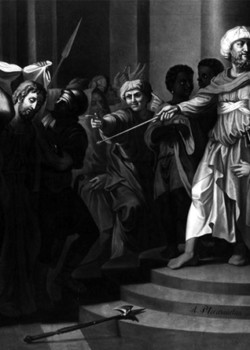
Herod Taunted Jesus
When they brought Jesus before Herod, the Tetrarch was startled by his stately appearance and the calm composure of his countenance. For some fifteen minutes Herod asked Jesus questions, but the Master would not answer. Herod taunted and dared him to perform a miracle, but Jesus would not reply to his many inquiries or respond to his taunts.
Then Herod turned to the chief priests and the Sadducees and, giving ear to their accusations, heard all and more than Pilate had listened to regarding the alleged evil doings of the Son of Man. Finally, being convinced that Jesus would neither talk nor perform a wonder for him, Herod, after making fun of him for a time, arrayed him in an old purple royal robe and sent him back to Pilate. Herod knew he had no jurisdiction over Jesus in Judea. Though he was glad to believe that he was finally to be rid of Jesus in Galilee, he was thankful that it was Pilate who had the responsibility of putting him to death. Herod never had fully recovered from the fear that cursed him as a result of killing John the Baptist. Herod had at certain times even feared that Jesus was John risen from the dead. Now he was relieved of that fear since he observed that Jesus was a very different sort of person from the outspoken and fiery prophet who dared to expose and denounce his private life. ~ The Urantia Book, 185:4.2

Pilate Questions Jesus Further
Pilate then turned around to question Jesus further, saying: “And now about the third accusation against you, are you the king of the Jews?” Since there was a tone of possibly sincere inquiry in Pilate’s voice, Jesus smiled on the procurator and said: “Pilate, do you ask this for yourself, or do you take this question from these others, my accusers?” Whereupon, in a tone of partial indignation, the governor answered: “Am I a Jew? Your own people and the chief priests delivered you up and asked me to sentence you to death. I question the validity of their charges and am only trying to find out for myself what you have done. Tell me, have you said that you are the king of the Jews, and have you sought to found a new kingdom?” ~ The Urantia Book, 185:3.2
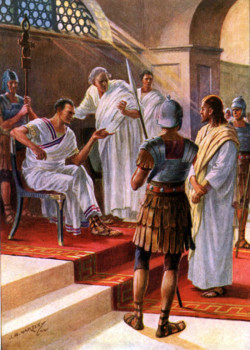
Yes, I am a King
Then said Jesus to Pilate: “Do you not perceive that my kingdom is not of this world? If my kingdom were of this world, surely would my disciples fight that I should not be delivered into the hands of the Jews. My presence here before you in these bonds is sufficient to show all men that my kingdom is a spiritual dominion, even the brotherhood of men who, through faith and by love, have become the sons of God. And this salvation is for the gentile as well as for the Jew.”
“Then you are a king after all?” said Pilate. And Jesus answered: “Yes, I am such a king, and my kingdom is the family of the faith sons of my Father who is in heaven. For this purpose was I born into this world, even that I should show my Father to all men and bear witness to the truth of God. And even now do I declare to you that every one who loves the truth hears my voice.” ~ The Urantia Book, 185:3.3

The So-Called Trial of Jesus
It was about half past three o’clock this Friday morning when the chief priest, Caiaphas, called the Sanhedrist court of inquiry to order and asked that Jesus be brought before them for his formal trial. On three previous occasions the Sanhedrin, by a large majority vote, had decreed the death of Jesus, had decided that he was worthy of death on informal charges of lawbreaking, blasphemy, and flouting the traditions of the fathers of Israel.
This was not a regularly called meeting of the Sanhedrin and was not held in the usual place, the chamber of hewn stone in the temple. This was a special trial court of some thirty Sanhedrists and was convened in the palace of the high priest. John Zebedee was present with Jesus throughout this so-called trial.
How these chief priests, scribes, Sadducees, and some of the Pharisees flattered themselves that Jesus, the disturber of their position and the challenger of their authority, was now securely in their hands! And they were resolved that he should never live to escape their vengeful clutches. ~ The Urantia Book, 184:3.1
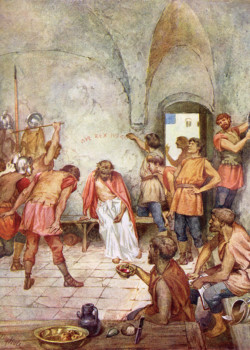
He Uttered No Word
Throughout this awful hour Jesus uttered no word. To this gentle and sensitive soul of humankind, joined in personality relationship with the God of all this universe, there was no more bitter portion of his cup of humiliation than this terrible hour at the mercy of these ignorant and cruel guards and servants, who had been stimulated to abuse him by the example of the members of this so-called Sanhedrist court.
The human heart cannot possibly conceive of the shudder of indignation that swept out over a vast universe as the celestial intelligences witnessed this sight of their beloved Sovereign submitting himself to the will of his ignorant and misguided creatures on the sin-darkened sphere of unfortunate Urantia. ~ The Urantia Book, 184:4.3

Perfect Composure and Unbroken Silence
But Caiaphas could not longer endure the sight of the Master standing there in perfect composure and unbroken silence. He thought he knew at least one way in which the prisoner might be induced to speak. Accordingly, he rushed over to the side of Jesus and, shaking his accusing finger in the Master's face, said: "I adjure you, in the name of the living God, that you tell us whether you are the Deliverer, the Son of God." Jesus answered Caiaphas: "I am. Soon I go to the Father, and presently shall the Son of Man be clothed with power and once more reign over the hosts of heaven."
When the high priest heard Jesus utter these words, he was exceedingly angry, and rending his outer garments, he exclaimed: "What further need have we of witnesses? Behold, now have you all heard this man's blasphemy. What do you now think should be done with this lawbreaker and blasphemer?" And they all answered in unison, "He is worthy of death; let him be crucified." ~ The Urantia Book, 184:3.14

How can you reject the light of God?
Annas entered his spacious audience chamber, seated himself in a large chair, and commanded that Jesus be brought before him. After a few moments spent in silently surveying the Master, he said: "You realize that something must be done about your teaching since you are disturbing the peace and order of our country." As Annas looked inquiringly at Jesus, the Master looked full into his eyes but made no reply. Again Annas spoke, "What are the names of your disciples, besides Simon Zelotes, the agitator?" Again Jesus looked down upon him, but he did not answer.
Annas was considerably disturbed by Jesus' refusal to answer his questions, so much so that he said to him: "Do you have no care as to whether I am friendly to you or not? Do you have no regard for the power I have in determining the issues of your coming trial?" When Jesus heard this, he said: "Annas, you know that you could have no power over me unless it were permitted by my Father. Some would destroy the Son of Man because they are ignorant; they know no better, but you, friend, know what you are doing. How can you, therefore, reject the light of God?" ~ The Urantia Book, 184:1.4
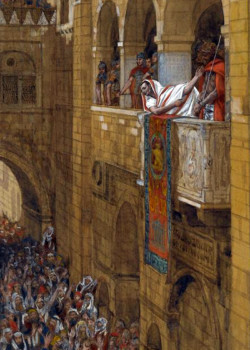
There Stood Jesus of Nazareth
Then Pilate led forth this bleeding and lacerated prisoner and, presenting him before the mixed multitude, said: “Behold the man! Again I declare to you that I find no crime in him, and having scourged him, I would release him.”
There stood Jesus of Nazareth, clothed in an old purple royal robe with a crown of thorns piercing his kindly brow. His face was bloodstained and his form bowed down with suffering and grief. But nothing can appeal to the unfeeling hearts of those who are victims of intense emotional hatred and slaves to religious prejudice. This sight sent a mighty shudder through the realms of a vast universe, but it did not touch the hearts of those who had set their minds to effect the destruction of Jesus.~ The Urantia Book, 185:6.3
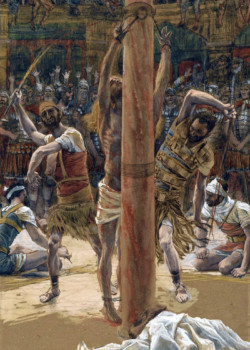
An Illegal Procedure
Pilate would make one last appeal to their pity. Being afraid to defy the clamor of this misled mob who cried for the blood of Jesus, he ordered the Jewish guards and the Roman soldiers to take Jesus and scourge him. This was in itself an unjust and illegal procedure since the Roman law provided that only those condemned to die by crucifixion should be thus subjected to scourging. The guards took Jesus into the open courtyard of the praetorium for this ordeal. Though his enemies did not witness this scourging, Pilate did, and before they had finished this wicked abuse, he directed the scourgers to desist and indicated that Jesus should be brought to him. ~ The Urantia Book, 185:6.2
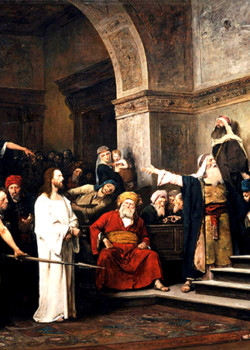
Behold God and man!
Pilate spoke more truly than he knew when, after Jesus had been scourged, he presented him before the multitude, exclaiming, “Behold the man!” Indeed, the fear-ridden Roman governor little dreamed that at just that moment the universe stood at attention, gazing upon this unique scene of its beloved Sovereign thus subjected in humiliation to the taunts and blows of his darkened and degraded mortal subjects. And as Pilate spoke, there echoed throughout all Nebadon, “Behold God and man!” Throughout a universe, untold millions have ever since that day continued to behold that man, while the God of Havona, the supreme ruler of the universe of universes, accepts the man of Nazareth as the satisfaction of the ideal of the mortal creatures of this local universe of time and space. In his matchless life he never failed to reveal God to man. Now, in these final episodes of his mortal career and in his subsequent death, he made a new and touching revelation of man to God. ~ The Urantia Book, 186:2.11

You are a king?
“Then you are a king after all?” said Pilate. And Jesus answered: “Yes, I am such a king, and my kingdom is the family of the faith sons of my Father who is in heaven. For this purpose was I born into this world, even that I should show my Father to all men and bear witness to the truth of God. And even now do I declare to you that every one who loves the truth hears my voice.” ~ The Urantia Book, 185:3.4

Pilate was Confused
Pilate was confused in mind, fearful of the Jews in his heart, and mightily stirred in his spirit by the spectacle of Jesus’ standing there in majesty before his bloodthirsty accusers and gazing down on them, not in silent contempt, but with an expression of genuine pity and sorrowful affection. ~ The Urantia Book, 185:2.16

Death Sentence Confirmed
At six o’clock that morning Jesus was led forth from the home of Caiaphas to appear before Pilate for confirmation of the sentence of death which this Sanhedrist court had so unjustly and irregularly decreed. ~ The Urantia Book, 184:5.11

A Universal Shudder of Indignation
The human heart cannot possibly conceive of the shudder of indignation that swept out over a vast universe as the celestial intelligences witnessed this sight of their beloved Sovereign submitting himself to the will of his ignorant and misguided creatures on the sin-darkened sphere of unfortunate Urantia. ~ The Urantia Book, 184:4.4

His Majestic Appearance
Jesus appeared before this court clothed in his usual garments and with his hands bound together behind his back. The entire court was startled and somewhat confused by his majestic appearance. Never had they gazed upon such a prisoner nor witnessed such composure in a man on trial for his life. ~ The Urantia Book, 184:3.5

How can you reject the Light of God?
Annas was considerably disturbed by Jesus’ refusal to answer his questions, so much so that he said to him: “Do you have no care as to whether I am friendly to you or not? Do you have no regard for the power I have in determining the issues of your coming trial?” When Jesus heard this, he said: “Annas, you know that you could have no power over me unless it were permitted by my Father. Some would destroy the Son of Man because they are ignorant; they know no better, but you, friend, know what you are doing. How can you, therefore, reject the light of God?” ~ The Urantia Book, 184:1.5
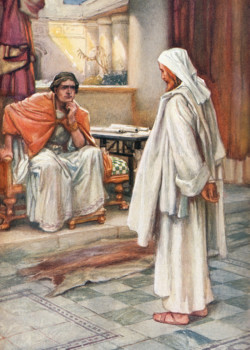
Pilate Could not Fathom Jesus' Words
Pilate was not able to fathom Jesus’ words, nor was he able to understand the nature of his spiritual kingdom, but he was now certain that the prisoner had done nothing worthy of death. One look at Jesus, face to face, was enough to convince even Pilate that this gentle and weary, but majestic and upright, man was no wild and dangerous revolutionary who aspired to establish himself on the temporal throne of Israel. Pilate thought he understood something of what Jesus meant when he called himself a king, for he was familiar with the teachings of the Stoics, who declared that “the wise man is king.” Pilate was thoroughly convinced that, instead of being a dangerous seditionmonger, Jesus was nothing more or less than a harmless visionary, an innocent fanatic. ~ The Urantia Book, 185:3.6
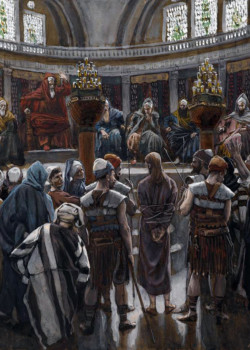
His Majestic Appearance
Jesus appeared before this court clothed in his usual garments and with his hands bound together behind his back. The entire court was startled and somewhat confused by his majestic appearance. Never had they gazed upon such a prisoner nor witnessed such composure in a man on trial for his life.
The Jewish law required that at least two witnesses must agree upon any point before a charge could be laid against the prisoner. Judas could not be used as a witness against Jesus because the Jewish law specifically forbade the testimony of a traitor. More than a score of false witnesses were on hand to testify against Jesus, but their testimony was so contradictory and so evidently trumped up that the Sanhedrists themselves were very much ashamed of the performance. Jesus stood there, looking down benignly upon these perjurers, and his very countenance disconcerted the lying witnesses. Throughout all this false testimony the Master never said a word; he made no reply to their many false accusations. ~ The Urantia Book, 184:3.5
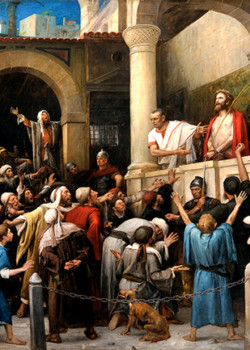
Behold God and man!
Pilate spoke more truly than he knew when, after Jesus had been scourged, he presented him before the multitude, exclaiming, “Behold the man!” Indeed, the fear-ridden Roman governor little dreamed that at just that moment the universe stood at attention, gazing upon this unique scene of its beloved Sovereign thus subjected in humiliation to the taunts and blows of his darkened and degraded mortal subjects. And as Pilate spoke, there echoed throughout all Nebadon, “Behold God and man!” Throughout a universe, untold millions have ever since that day continued to behold that man, while the God of Havona, the supreme ruler of the universe of universes, accepts the man of Nazareth as the satisfaction of the ideal of the mortal creatures of this local universe of time and space. In his matchless life he never failed to reveal God to man. Now, in these final episodes of his mortal career and in his subsequent death, he made a new and touching revelation of man to God. ~ The Urantia Book, 186:2.11
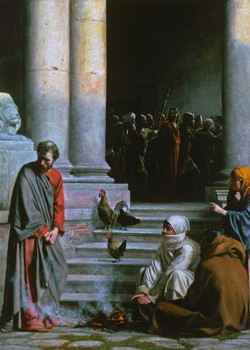
Never Forgotten
As the Master passed Peter, he saw, by the light of the torches, the look of despair on the face of his former self-confident and superficially brave apostle, and he turned and looked upon Peter. Peter never forgot that look as long as he lived. It was such a glance of commingled pity and love as mortal man had never beheld in the face of the Master.
~ The Urantia Book, (184:2.8)


